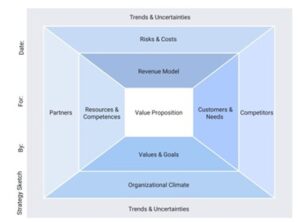Strategy: A compass of policymaking
A viable and useful strategic approach includes having a clear vision with actionable points for implementation and outcomes

 In the realm of policymaking, having a robust strategy in place is imperative, as it serves as a roadmap for building and executing effective policies. It includes developing a set of goals and long-term plans. Ideally, a strategy specifies what an organisation does, how it should be done and the direction it will lead to.
In the realm of policymaking, having a robust strategy in place is imperative, as it serves as a roadmap for building and executing effective policies. It includes developing a set of goals and long-term plans. Ideally, a strategy specifies what an organisation does, how it should be done and the direction it will lead to.
So, if this is the definition, we need to understand how it can be done in the field of policymaking. To start with, it is not only relevant but also helps in providing a structured and goal-driven programme and policies. It contributes to designing, implementing, monitoring, evaluating and helps in making policymaking a holistic effort. Some of the important factors which support this include:
What? Lay a clear roadmap with transparency
How? Define appropriate goals to achieve policy outcomes
Align policies with long-term vision and not make ad hoc decisions
What? Augment effectiveness of policies
How? Identify challenges, objectives and outcomes before implementation
What? Optimise use of resources
How? Manage funds, human resources and technology through coordinated efforts and activities
What? Enable stakeholder involvement and engagement
How? Encourage collaborations with various actors to include Think Tanks, academia and the corporate. Civil society organisations to contribute and be partners in key decision-making activities
What? Allow flexibility and adaptation simple
How? Make space to respond to crises
Boost planning and mitigation of challenges
What? Instils monitoring and accountability
How? Develop measurable parameters to include robust indicators
Encourage systematic monitoring and evaluation to include providing course corrections where required.
How can this be achieved?
To ensure that you have built a strong strategy to ensure viability and success, you need to know the following.
| No | Description | Yes | No |
| 1 | What is it your key domain/s/expertise? | ||
| 2 | Are your stakeholders relevant and cooperative? | ||
| 3 | Are you able manage your financial risks well? | ||
| 4 | Do your goals and value serve as a goal post as to where you want to go? | ||
| 5 | Are you well-equipped to face uncertainties? | ||
| 6 | Have you identified the usp of your organisation? | ||
| 7 | Does the culture of your organisation allow you to be flexible? | ||
| 8 | Do you have well-defined SoP’s, protocols and processes to have a smooth and rich work culture? | ||
| 9 | Are you able to deal with crisis management-human and financial resources? | ||
| 10 | Do you have a system to measure impact? |
You can identify your strengths and areas for improvements based on your scoring:
70% above: Good and stable
Between 40% and 69%: Average need to work on weak areas
Below 40%: Need to work on the strategy imbalances
Examples of Strategic Approach by the Government of India
- Strategic targets helped in the Swachh Bharat Mission where it tracked the status and progress
- The COVID-19 strategy allowed the Government to plan, phase out rollouts and prioritise actions and helped in monitoring aspects
- The National Education Policy (NES) 2020 has mapped out strategic components, which help in implementation
- The National Health Mission has brought together all relevant stakeholders under one umbrella to ensure that it works well
To conclude, a viable and useful strategic approach includes having a clear vision with actionable points for implementation and outcomes and also brings together all stakeholders and manages resources effectively. In addition, it depicts transparency by having measurable parameters, which help in sustainability in the long run.
My interactions and readings on this topic brought me to this relevant image, and I found it appropriate to share with the readers.

Banner image by Andrea Piacquadio: https://www.pexels.com/photo/crop-businessman-giving-contract-to-woman-to-sign-3760067/





